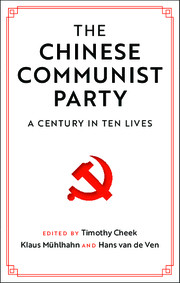Book contents
- Reviews
- The Chinese Communist Party
- The Chinese Communist Party
- Copyright page
- Contents
- Illustrations
- About the Contributors
- Acknowledgments
- Timeline of the Chinese Communist Party
- Map of China Today
- Introduction
- Chapter 1 – 1920s
- Chapter 2 – 1930s
- Chapter 3 – 1940s
- Chapter 4 – 1950s
- Chapter 5 – 1960s
- Chapter 6 – 1970s
- Chapter 7 – 1980s
- 7 The 1980s
- Chapter 8 – 1990s
- Chapter 9 – 2000s
- Chapter 10 – 2010s
- Afterword
- Appendix Selected Further Readings
- Notes
- Index
7 - The 1980s
Zhao Ziyang and the Voices of Reform
from Chapter 7 – 1980s
Published online by Cambridge University Press: 06 May 2021
- Reviews
- The Chinese Communist Party
- The Chinese Communist Party
- Copyright page
- Contents
- Illustrations
- About the Contributors
- Acknowledgments
- Timeline of the Chinese Communist Party
- Map of China Today
- Introduction
- Chapter 1 – 1920s
- Chapter 2 – 1930s
- Chapter 3 – 1940s
- Chapter 4 – 1950s
- Chapter 5 – 1960s
- Chapter 6 – 1970s
- Chapter 7 – 1980s
- 7 The 1980s
- Chapter 8 – 1990s
- Chapter 9 – 2000s
- Chapter 10 – 2010s
- Afterword
- Appendix Selected Further Readings
- Notes
- Index
Summary
Chapter 7 focuses on the economic and political reforms of General Secretary Zhao Ziyang (1919–2005) and his predecessor Hu Yaobang (1915–1989). The reforms are placed within the context of both the controversial “reform and opening” policies of paramount leader Deng Xiaoping (1904–1997), and also the larger context of intra-Party ideological debates dating back to founding of the nation. Zhao’s early career as Party secretary in his native county before 1949 is contrasted with his later posting to Guangdong as part of an initiative to break local resistance to land reform in the 1950s. The disastrous Great Leap Forward is presented as a formative experience for Zhao, leading him to side with Mao’s critics, a decision which would in turn lead to his fall from power in 1967. His eventual rehabilitation by Zhou Enlai in 1971 is described as having led Zhao to support political and economic reform beginning with the Li Yizhe controversary of 1974 and culminating in his work in the late 1970s as Party secretary in Sichuan, where he was responsible for implementing Deng Xiaoping’s reforms in the agricultural sector. The chapter concludes with a discussion of Zhao’s rapid promotion to premier by 1980, and his pragmatic approach to political reform and liberalization, which would lead to his eventual downfall for a second time on the eve of the Tiananmen massacre in 1989, and contested legacy in the PRC today.
Keywords
- Type
- Chapter
- Information
- The Chinese Communist PartyA Century in Ten Lives, pp. 151 - 172Publisher: Cambridge University PressPrint publication year: 2021



